| Reviews & Columns |
|
Reviews DVD TV on DVD Blu-ray 4K UHD International DVDs In Theaters Reviews by Studio Video Games Features Collector Series DVDs Easter Egg Database Interviews DVD Talk Radio Feature Articles Columns Anime Talk DVD Savant Horror DVDs The M.O.D. Squad Art House HD Talk Silent DVD
|
DVD Talk Forum |
|
|
| Resources |
|
DVD Price Search Customer Service #'s RCE Info Links |
|
Columns
|
|
|
Dark Places
Lionsgate Home Entertainment // R // October 6, 2015
List Price: $24.99 [Buy now and save at Amazon]
The Film:
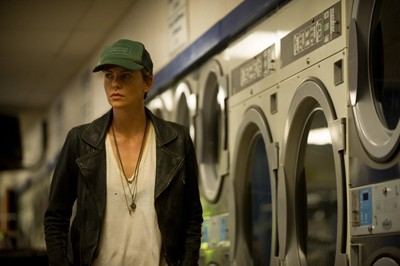 "Gone Girl" displays a hefty progression in Gillian Flynn's writing from that found within "Dark Places", her sophomore novel, revealing a noteworthy evolution in her flawed and distrustful protagonists, how she messes with the reader through the chronology of events, and twists with a strong thematic undercurrent. Unsurprisingly, the more popular of her novels beat the others to the film-adaptation punch -- directed by suspense mastermind David Fincher himself, no less -- casting a pretty broad shadowy that any others released afterwards will struggle to escape from. Despite shooting at roughly the same time and beginning production earlier, writer-director Gilles Paquet-Brenner's take on Dark Places arrives some months after Gone Girl, sporting unsavory subject matter and a more caustic protagonist plowing through the elusiveness of a family murder mystery. Unfortunately, neither the vigor of its performances nor the shrewd duplication of Flynn's foreboding tone can overpower the frustration it creates toward the sensational-yet-sluggish truths buried and sidestepped within.
"Gone Girl" displays a hefty progression in Gillian Flynn's writing from that found within "Dark Places", her sophomore novel, revealing a noteworthy evolution in her flawed and distrustful protagonists, how she messes with the reader through the chronology of events, and twists with a strong thematic undercurrent. Unsurprisingly, the more popular of her novels beat the others to the film-adaptation punch -- directed by suspense mastermind David Fincher himself, no less -- casting a pretty broad shadowy that any others released afterwards will struggle to escape from. Despite shooting at roughly the same time and beginning production earlier, writer-director Gilles Paquet-Brenner's take on Dark Places arrives some months after Gone Girl, sporting unsavory subject matter and a more caustic protagonist plowing through the elusiveness of a family murder mystery. Unfortunately, neither the vigor of its performances nor the shrewd duplication of Flynn's foreboding tone can overpower the frustration it creates toward the sensational-yet-sluggish truths buried and sidestepped within.
As the sole survivor of the Kinnakee (Kansas) Massacre that claimed the lives of her mother and sisters, seven-year-old Libby Day testified that her brother, Ben (played in his youth by a quietly sinister and enigmatic Tye Sheridan), was responsible for the murders, drawing further national attention due to the killing's association with Satanic ritualism. Nearly twenty-five years after to the day, Libby (Charlize Theron) has run out of donation funds from the sympathetic and has no income prospects in sight, leaving her desperate for cash and saddled with numerous behavioral issues. Opportunely, she receives a solicitation from the leader (Nicholas Hoult) of the Kill Club, a group that specializes in solving unsolved or wrongly-solved cases, hoping to fund an investigation into the purported innocence of Ben Day (a sympathetic Corey Stoll) and uncover the veracity of what happen that night. Libby's dedication to the idea that her brother was responsible isn't strong enough to pass up the cash, luring her back into the bleakness of those murders and discovering that her memory of that night isn't as accurate as she thought it was.
Those who've read Dark Places will be quick to point out that Charlize Theron doesn't come close to matching the physical attributes of Gillian Flynn's Libby, switching out the book's petite, curvy woman with visible red roots for a tall, lanky frame topped with a trucker cap throughout. What does carry over, and what's most important, is the blunt and despondent aura following the character around after years of depressive inertia, a comfort zone for Theron given her experience inside the minds of tormented and acerbic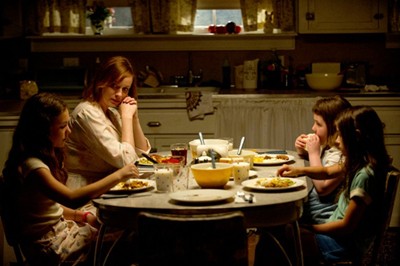 loners. The prickly body language and thousand-yard stare she gives to Libby languishes within every step she takes toward new evidence, underscored by the verbal fury of her impatience whenever her integrity comes into question. Accompanied by Nicholas Hoult's mousy curiosity as the Kill Club's orchestrator, Lyle, Theron channels that haunted emotional tempo towards those connected to the situation, from a stripper (Drea de Matteo) recounting her molestation at a young age to Libby's deadbeat father, Runner (Sean Bridgers), assuring us that anything unearthed by her reluctant journey through her "dark places" won't restore what's been lost.
loners. The prickly body language and thousand-yard stare she gives to Libby languishes within every step she takes toward new evidence, underscored by the verbal fury of her impatience whenever her integrity comes into question. Accompanied by Nicholas Hoult's mousy curiosity as the Kill Club's orchestrator, Lyle, Theron channels that haunted emotional tempo towards those connected to the situation, from a stripper (Drea de Matteo) recounting her molestation at a young age to Libby's deadbeat father, Runner (Sean Bridgers), assuring us that anything unearthed by her reluctant journey through her "dark places" won't restore what's been lost.
Similarly to Gillian Flynn's novel, Dark Places jumps between the '80s and the present on the thrust of Libby's investigation, juxtaposing the aches created by her discoveries with the events leading up to her family's murder, events that she doesn't really remember or simply doesn't know about. While Gilles Paquet-Brenner hits the necessary beats leading up to the massacre -- the origin and severity of Ben's deviances; his secretive relationship with wealthy wild-child Diondra (Chloe Grace Moretz); his mother's frantic search for him in the midst of troubling accusations -- the writer-director does so in a way that hides information that's vital to elaborating on the other people involved, for the sake of dwelling on redundant mysteries. Leaving relevant characters in an underdeveloped state as they enter and exit the murky history of the Kinnake Massacre, the film forces them to serve purposes and move the story forward instead of existing as genuine personalities or, more importantly, lingering as suspects worth considering. In streamlining the story, Paquet-Brenner chops away the red herrings and counter-suspicions that form around substantial characters, clearing the way for Libby to discover the truth without engaging the audience's imagination over what that truth could actually be.
Revealing what really happened that day steers Dark Places through some rather provocative territory in the outskirts of the American breadbasket, ranging from psychotropic drugs and occult ritualism to illicit activities with children. Aside from the fraught, penniless panic of Ben's mother in response to such things threatening her family, displaying the lengths a mother will go to secure her children, the film concerns itself little with the tough themes of community witch-hunts and the fallibility of testimonies that are unceremoniously touched upon in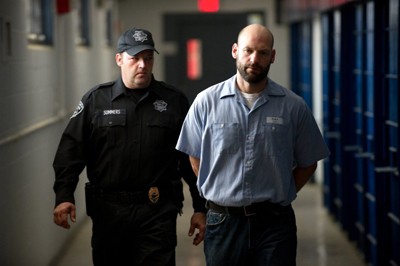 Paquet-Brenner's docile adaptation. They're merely flavor for the plodding whodunit, thickening the atmosphere's edginess without the social critique that'd make them intriguing alongside the mystery's moving parts. Some of that boils down to the flexibility of a point-of-view telling of events and the truncation of Gillian Flynn's source material into screenplay form, but it's also in how the writer-director chooses what to conceal and what -- and when -- to reveal. On the surface, this is a jumbled but faithful retelling; in terms of substance and breadth, things are lacking.
Paquet-Brenner's docile adaptation. They're merely flavor for the plodding whodunit, thickening the atmosphere's edginess without the social critique that'd make them intriguing alongside the mystery's moving parts. Some of that boils down to the flexibility of a point-of-view telling of events and the truncation of Gillian Flynn's source material into screenplay form, but it's also in how the writer-director chooses what to conceal and what -- and when -- to reveal. On the surface, this is a jumbled but faithful retelling; in terms of substance and breadth, things are lacking.
Dark Places always was a story that worked in spite of the screwy answers at the end of the road, overly enthralled with its cluttered machinations and flimsy solutions, all of which remain intact despite Gilles Paquet-Brenner's subtle efforts to simplify bits of the convoluted tragedy. Sure, there's something effortlessly watchable about seeing how the procedural saga of Libby Day eventually plays out, hinged on the arduous sacrifices of parenthood and the difficulties in seeking absolution for one's past mistakes, bolstered by Christina Hendricks' devoted, tearful embodiment of a mother running out of options. A nagging sense of disbelief over anticlimactic twists in the Day household undercut that emotional sincerity, though, almost making the idea of Ben's Satan-inspired massacre of his sisters and mother seem less outlandish than the reality. Alas, that's part and parcel with Gillian Flynn's sophomore novel, and Paquet-Brenner can only be slighted so much for following through with what's there, even if it still doesn't stick.
The Blu-ray:
Video and Audio:
Dark Places emerges from the shadows in a capable and steady-handed 2.35:1-framed, 1080p AVC treatment from Lionsgate Home Entertainment. Black levels occasionally run a hair heavy, encroaching on the knitting of Ben's black skullcap and obscuring items in a dimly-lit depot, and a bit light during scenes involving diffused light sources. The contrast's balance and stability are generally quite responsive and appropriate in a wide range of scenes, though: navigating the livewire atmosphere of the Kill Club, chatting in the heavy colored lights of a strip joint, and during the Kinnakee Massacre itself. The digital photography rests in that middle-ground between preserving its sharp objects yet never really projecting any details worth remembering: the metallic contours of a laundromat, the jagged ends of Libby's hair, and the engravings on jewelry sustain a suitable caliber of clarity. Skin tones are warm and suitable in relation to the fluctuating illumination, crafting a slightly rusted and downtrodden aesthetic to the modern-day sequences that marries well with the handful of instances of grainy black-and-white flashback footage.
The DTS-HD Master Audio track amounts to about the same level of commonplace but entirely serviceable quality, finding its comfort zone in the stillness of the atmosphere and the few brusque moments of assertive effects. Dialogue rarely suffers from intrusive volume levels, largely because it rarely has to occupy the same space as other surround elements, though the moderate clarity of a few sequences will have some leering in closer to discern what's being said. When shotguns go off and hatchets fall into flesh, they hit with a meaty an unsettling thud to punctuate the few horrific elements present in the sound design, reaching into the lower-end spectrum for tightly-rendered bass response. The atmosphere never really becomes noteworthy unless tension's hanging in the air, such as the echo of voices in an industrial space and the distant resonance of music in clubs and ramshackle hangout spots. English and Spanish subtitles are available alongside the sole audio option.
Special Features:
The supplements are relatively thin for Dark Places, which isn't exactly surprising given the abrupt, under-the-radar theatrical and VOD release of the film, but they deliver enough interest to be worth the time. Taking center stage is Bringing Dark Places to Life (23:08, 16x9 HD), featuring the cast and crew touching on the complicated path spanning several years in getting the film made, from the disparity of Charlize Theron's appearance compared to the book's protagonist and conveying the "essence" of her regardless to steering clear of the genre's formulaic nature. The interviews are intermixed with lucid behind-the-scenes footage, much as you'd expect, while author Gillian Flynn's participation in the conversation adding a bit of validity (and a tinge of bias) to the comments made about deviating from the source material. About the Author: Gillian Flynn & Dark Places (9:16, 16x9 HD) takes a pretty objective approach in having the author discuss her novel and giving her fictional Kansas city a "gothic twist".
Final Thoughts:
Dark Places, another film adaptation from Gillian Flynn's stable of edgy novels, ends up being a bleak, operative thriller hinged on complicated undertones molding around the atmosphere of farmland USA. The material's themes could've achieved much more than what's presented, though, a faltering area of the narrative that struggles against the waywardness of the reality behind the Kinnakee Massacre. A strong performance from Charlize Theron comes close to transcending the dissimilarities she has in contrast to the novel's character, and Gilles Paquet-Brenner's presentation of the glum atmosphere elevates the intrigue level, but not enough to redeem its fundamental stumbles in the dark. Lionsgate's Blu-ray looks and sounds just fine, and sports a decent collection of extras, but there isn't enough return value here to merit more than a Rental.
Thomas Spurlin, Staff Reviewer -- DVDTalk Reviews | Personal Blog/Site
 "Gone Girl" displays a hefty progression in Gillian Flynn's writing from that found within "Dark Places", her sophomore novel, revealing a noteworthy evolution in her flawed and distrustful protagonists, how she messes with the reader through the chronology of events, and twists with a strong thematic undercurrent. Unsurprisingly, the more popular of her novels beat the others to the film-adaptation punch -- directed by suspense mastermind David Fincher himself, no less -- casting a pretty broad shadowy that any others released afterwards will struggle to escape from. Despite shooting at roughly the same time and beginning production earlier, writer-director Gilles Paquet-Brenner's take on Dark Places arrives some months after Gone Girl, sporting unsavory subject matter and a more caustic protagonist plowing through the elusiveness of a family murder mystery. Unfortunately, neither the vigor of its performances nor the shrewd duplication of Flynn's foreboding tone can overpower the frustration it creates toward the sensational-yet-sluggish truths buried and sidestepped within.
"Gone Girl" displays a hefty progression in Gillian Flynn's writing from that found within "Dark Places", her sophomore novel, revealing a noteworthy evolution in her flawed and distrustful protagonists, how she messes with the reader through the chronology of events, and twists with a strong thematic undercurrent. Unsurprisingly, the more popular of her novels beat the others to the film-adaptation punch -- directed by suspense mastermind David Fincher himself, no less -- casting a pretty broad shadowy that any others released afterwards will struggle to escape from. Despite shooting at roughly the same time and beginning production earlier, writer-director Gilles Paquet-Brenner's take on Dark Places arrives some months after Gone Girl, sporting unsavory subject matter and a more caustic protagonist plowing through the elusiveness of a family murder mystery. Unfortunately, neither the vigor of its performances nor the shrewd duplication of Flynn's foreboding tone can overpower the frustration it creates toward the sensational-yet-sluggish truths buried and sidestepped within. As the sole survivor of the Kinnakee (Kansas) Massacre that claimed the lives of her mother and sisters, seven-year-old Libby Day testified that her brother, Ben (played in his youth by a quietly sinister and enigmatic Tye Sheridan), was responsible for the murders, drawing further national attention due to the killing's association with Satanic ritualism. Nearly twenty-five years after to the day, Libby (Charlize Theron) has run out of donation funds from the sympathetic and has no income prospects in sight, leaving her desperate for cash and saddled with numerous behavioral issues. Opportunely, she receives a solicitation from the leader (Nicholas Hoult) of the Kill Club, a group that specializes in solving unsolved or wrongly-solved cases, hoping to fund an investigation into the purported innocence of Ben Day (a sympathetic Corey Stoll) and uncover the veracity of what happen that night. Libby's dedication to the idea that her brother was responsible isn't strong enough to pass up the cash, luring her back into the bleakness of those murders and discovering that her memory of that night isn't as accurate as she thought it was.
Those who've read Dark Places will be quick to point out that Charlize Theron doesn't come close to matching the physical attributes of Gillian Flynn's Libby, switching out the book's petite, curvy woman with visible red roots for a tall, lanky frame topped with a trucker cap throughout. What does carry over, and what's most important, is the blunt and despondent aura following the character around after years of depressive inertia, a comfort zone for Theron given her experience inside the minds of tormented and acerbic
 loners. The prickly body language and thousand-yard stare she gives to Libby languishes within every step she takes toward new evidence, underscored by the verbal fury of her impatience whenever her integrity comes into question. Accompanied by Nicholas Hoult's mousy curiosity as the Kill Club's orchestrator, Lyle, Theron channels that haunted emotional tempo towards those connected to the situation, from a stripper (Drea de Matteo) recounting her molestation at a young age to Libby's deadbeat father, Runner (Sean Bridgers), assuring us that anything unearthed by her reluctant journey through her "dark places" won't restore what's been lost.
loners. The prickly body language and thousand-yard stare she gives to Libby languishes within every step she takes toward new evidence, underscored by the verbal fury of her impatience whenever her integrity comes into question. Accompanied by Nicholas Hoult's mousy curiosity as the Kill Club's orchestrator, Lyle, Theron channels that haunted emotional tempo towards those connected to the situation, from a stripper (Drea de Matteo) recounting her molestation at a young age to Libby's deadbeat father, Runner (Sean Bridgers), assuring us that anything unearthed by her reluctant journey through her "dark places" won't restore what's been lost. Similarly to Gillian Flynn's novel, Dark Places jumps between the '80s and the present on the thrust of Libby's investigation, juxtaposing the aches created by her discoveries with the events leading up to her family's murder, events that she doesn't really remember or simply doesn't know about. While Gilles Paquet-Brenner hits the necessary beats leading up to the massacre -- the origin and severity of Ben's deviances; his secretive relationship with wealthy wild-child Diondra (Chloe Grace Moretz); his mother's frantic search for him in the midst of troubling accusations -- the writer-director does so in a way that hides information that's vital to elaborating on the other people involved, for the sake of dwelling on redundant mysteries. Leaving relevant characters in an underdeveloped state as they enter and exit the murky history of the Kinnake Massacre, the film forces them to serve purposes and move the story forward instead of existing as genuine personalities or, more importantly, lingering as suspects worth considering. In streamlining the story, Paquet-Brenner chops away the red herrings and counter-suspicions that form around substantial characters, clearing the way for Libby to discover the truth without engaging the audience's imagination over what that truth could actually be.
Revealing what really happened that day steers Dark Places through some rather provocative territory in the outskirts of the American breadbasket, ranging from psychotropic drugs and occult ritualism to illicit activities with children. Aside from the fraught, penniless panic of Ben's mother in response to such things threatening her family, displaying the lengths a mother will go to secure her children, the film concerns itself little with the tough themes of community witch-hunts and the fallibility of testimonies that are unceremoniously touched upon in
 Paquet-Brenner's docile adaptation. They're merely flavor for the plodding whodunit, thickening the atmosphere's edginess without the social critique that'd make them intriguing alongside the mystery's moving parts. Some of that boils down to the flexibility of a point-of-view telling of events and the truncation of Gillian Flynn's source material into screenplay form, but it's also in how the writer-director chooses what to conceal and what -- and when -- to reveal. On the surface, this is a jumbled but faithful retelling; in terms of substance and breadth, things are lacking.
Paquet-Brenner's docile adaptation. They're merely flavor for the plodding whodunit, thickening the atmosphere's edginess without the social critique that'd make them intriguing alongside the mystery's moving parts. Some of that boils down to the flexibility of a point-of-view telling of events and the truncation of Gillian Flynn's source material into screenplay form, but it's also in how the writer-director chooses what to conceal and what -- and when -- to reveal. On the surface, this is a jumbled but faithful retelling; in terms of substance and breadth, things are lacking. Dark Places always was a story that worked in spite of the screwy answers at the end of the road, overly enthralled with its cluttered machinations and flimsy solutions, all of which remain intact despite Gilles Paquet-Brenner's subtle efforts to simplify bits of the convoluted tragedy. Sure, there's something effortlessly watchable about seeing how the procedural saga of Libby Day eventually plays out, hinged on the arduous sacrifices of parenthood and the difficulties in seeking absolution for one's past mistakes, bolstered by Christina Hendricks' devoted, tearful embodiment of a mother running out of options. A nagging sense of disbelief over anticlimactic twists in the Day household undercut that emotional sincerity, though, almost making the idea of Ben's Satan-inspired massacre of his sisters and mother seem less outlandish than the reality. Alas, that's part and parcel with Gillian Flynn's sophomore novel, and Paquet-Brenner can only be slighted so much for following through with what's there, even if it still doesn't stick.
The Blu-ray:
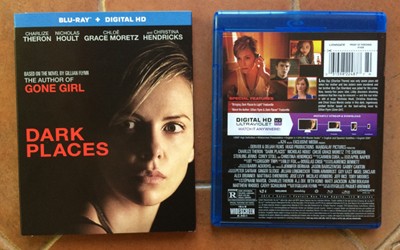 | 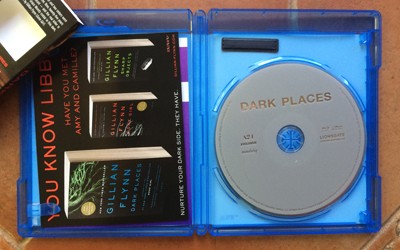 |
Video and Audio:
Dark Places emerges from the shadows in a capable and steady-handed 2.35:1-framed, 1080p AVC treatment from Lionsgate Home Entertainment. Black levels occasionally run a hair heavy, encroaching on the knitting of Ben's black skullcap and obscuring items in a dimly-lit depot, and a bit light during scenes involving diffused light sources. The contrast's balance and stability are generally quite responsive and appropriate in a wide range of scenes, though: navigating the livewire atmosphere of the Kill Club, chatting in the heavy colored lights of a strip joint, and during the Kinnakee Massacre itself. The digital photography rests in that middle-ground between preserving its sharp objects yet never really projecting any details worth remembering: the metallic contours of a laundromat, the jagged ends of Libby's hair, and the engravings on jewelry sustain a suitable caliber of clarity. Skin tones are warm and suitable in relation to the fluctuating illumination, crafting a slightly rusted and downtrodden aesthetic to the modern-day sequences that marries well with the handful of instances of grainy black-and-white flashback footage.
The DTS-HD Master Audio track amounts to about the same level of commonplace but entirely serviceable quality, finding its comfort zone in the stillness of the atmosphere and the few brusque moments of assertive effects. Dialogue rarely suffers from intrusive volume levels, largely because it rarely has to occupy the same space as other surround elements, though the moderate clarity of a few sequences will have some leering in closer to discern what's being said. When shotguns go off and hatchets fall into flesh, they hit with a meaty an unsettling thud to punctuate the few horrific elements present in the sound design, reaching into the lower-end spectrum for tightly-rendered bass response. The atmosphere never really becomes noteworthy unless tension's hanging in the air, such as the echo of voices in an industrial space and the distant resonance of music in clubs and ramshackle hangout spots. English and Spanish subtitles are available alongside the sole audio option.
Special Features:
The supplements are relatively thin for Dark Places, which isn't exactly surprising given the abrupt, under-the-radar theatrical and VOD release of the film, but they deliver enough interest to be worth the time. Taking center stage is Bringing Dark Places to Life (23:08, 16x9 HD), featuring the cast and crew touching on the complicated path spanning several years in getting the film made, from the disparity of Charlize Theron's appearance compared to the book's protagonist and conveying the "essence" of her regardless to steering clear of the genre's formulaic nature. The interviews are intermixed with lucid behind-the-scenes footage, much as you'd expect, while author Gillian Flynn's participation in the conversation adding a bit of validity (and a tinge of bias) to the comments made about deviating from the source material. About the Author: Gillian Flynn & Dark Places (9:16, 16x9 HD) takes a pretty objective approach in having the author discuss her novel and giving her fictional Kansas city a "gothic twist".
Final Thoughts:
Dark Places, another film adaptation from Gillian Flynn's stable of edgy novels, ends up being a bleak, operative thriller hinged on complicated undertones molding around the atmosphere of farmland USA. The material's themes could've achieved much more than what's presented, though, a faltering area of the narrative that struggles against the waywardness of the reality behind the Kinnakee Massacre. A strong performance from Charlize Theron comes close to transcending the dissimilarities she has in contrast to the novel's character, and Gilles Paquet-Brenner's presentation of the glum atmosphere elevates the intrigue level, but not enough to redeem its fundamental stumbles in the dark. Lionsgate's Blu-ray looks and sounds just fine, and sports a decent collection of extras, but there isn't enough return value here to merit more than a Rental.
|
| Popular Reviews |
| Sponsored Links |
|
|
| Sponsored Links |
|
|
| Release List | Reviews | Shop | Newsletter | Forum | DVD Giveaways | Blu-Ray | Advertise |
|
Copyright 2024 DVDTalk.com All Rights Reserved. Legal Info, Privacy Policy, Terms of Use,
Manage Preferences,
Your Privacy Choices | |||||||













